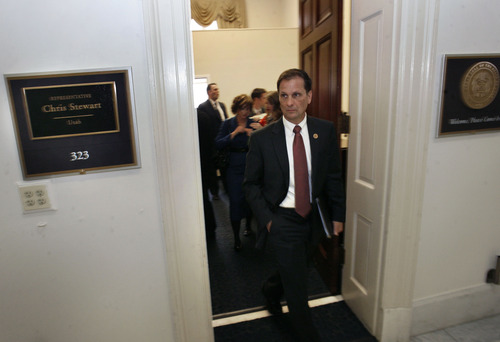This is an archived article that was published on sltrib.com in 2013, and information in the article may be outdated. It is provided only for personal research purposes and may not be reprinted.
As a rookie member of Congress, Rep. Chris Stewart should do his homework before he goes out on a limb to oppose scientific studies that have been repeatedly validated for politicians whose questions about the link between pollution and health predate Stewart's tenure by decades.
Two research studies conducted by Brigham Young University economist C. Arden Pope on the link between air pollution and public health are targeted by Stewart and some of his Republican cohorts, who call them "secret science" and suggest that air-quality rules are based on politics, not scientific data. That label is laughable, considering the repeated analysis given the studies over the 20 years or so since they were published.
Stewart is demanding the Environmental Protection Agency turn over the raw data used in the studies for laymen like himself to look at. But that would be illegal, because the 1.5 million Americans involved in the studies only agreed to allow scientists to look at their private medical information if the researchers promised contractually to keep the information private.
Stewart said the Obama administration should let the American people see all the data. And somehow, he has formed this opinion: "And the agency has readily admitted the limited information that they had made public was not sufficient for independent validation, replication, or re-analysis of the findings."
Either Stewart has been misinformed or is uninformed — inexcusable for a man in his position of power in the U.S. House of Representatives. If he had done research of his own, he would find that Pope's work has been scrutinized, not only by scientists, but also by the U.S. Supreme Court. When big polluting industries challenged the EPA's proposed controls on emissions, the high court upheld laws, including the Clean Air Act signed by Richard Nixon in 1970, that are supported by this data.
The studies also stood up to thorough re-analysis by 31 researchers working for an independent government-industry panel called the Health Effects Institute. And these aren't the only studies to confirm links between pollution and health problems.
Secret science? Hardly.
The EPA's air-quality rules are Americans' best defense against the toxic smog caused by emissions from cars, power plants, refineries, extraction industries and mines that causes or worsens heart, lung and respiratory problems and can even bring on premature death. To use public health as a political tool is shameful.



